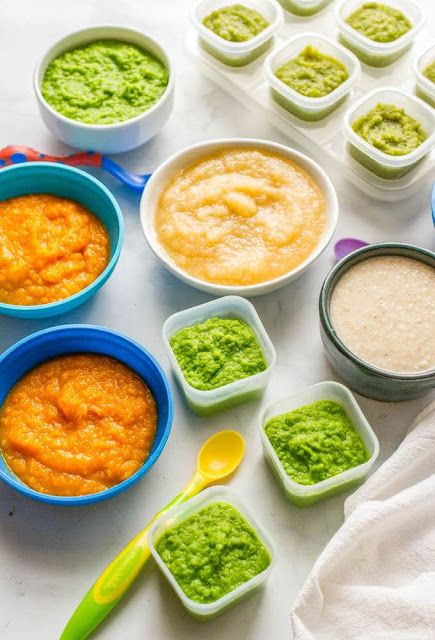Prepare Your Own Baby Food at Home
 |
Avoid Seasoning Until the Baby Grows Up a Little
|
By now, most individuals know that exclusive breastfeeding
is recommended until an infant’s six months of age. By then, it is advisable to
talk to your pediatrician regarding the best time for your baby to start on
solids. Once there is a positive nod from your physician, you can be happy to
know that there are various nutritious options available at the supermarket to
feed your baby. If you are planning to prepare your baby food at home, you can
be surprised to find even more wider choices as you not only get to pick from
all fruits and veggies in the produce aisle but also from frozen veggies and
fruits. This exposes your little one to various flavors and makes him/her to
try new foods without inhibitions as he/she grows. Also, when you prepare your
own baby food at home, you are avoiding all added sugars and salt which makes
you feel in control of your baby’s food choices.
Given below guidelines can be of utmost help when you choose
to prepare homemade baby food:
Start Gradually: Parents interested in making their
own baby foods might find the idea worthwhile though it might scare anyone
initially. It is better to start slowly with a few homemade foods to supplement
your store-bought baby foods. You can initially try mashing a ripe banana or
avocado and feeding your baby. If the response is positive, you can start using
less-common ones such as beets, broccoli, turnips, asparagus, mango, papaya and
spinach and experiment your baby’s liking to these foods. Using seasonal fruits
and vegetables makes the food tastier and fresher. The same food can also be
offered to other family members which is both nutritious and saves time as
well. Get to know different options to make your baby food tastier, healthier
and filled with variety by visiting the website www.firsteatright.com.
Preparing Foods: Sanitation and cleanliness are
extremely vital while preparing baby foods. Ensure to use only thoroughly
washed produce, clean hands, utensils, cutting boards and kitchen countertops.
- Wash, peel and remove seeds/pits from produce, taking extra caution with produce that grow close to ground (potatoes, onions and carrots) as they might contain harmful bacteria that may cause food poisoning
- Cook food with minimum water until extremely tender to retain the essential vitamins and minerals in produce. If you are cooking meat and fish, remove all fat, inedible tissue, skin and bones before cooking. Ensure that all poultry and meat products are cooked to proper internal temperatures before serving. Babies are susceptible to food poisoning due to undercooked meats, poultry and eggs.
- Puree or mash fresh fruit or canned fruit without adding honey, corn syrup or other sweeteners.
- You can freeze batches of prepared baby food for later use. Freeze baby foods in ice cube trays and once frozen, put the cubes into freezer-safe food containers for single-serving portions.
- Those preparing the same food for the entire family can remove the baby’s portion before adding salt and seasonings. An infant has extremely sensitive taste buds and it is advisable to wait until the baby grows becoming used to table food before adding seasonings other than salt to baby foods.
Safeguarding & Storing Baby Food: Preparing baby
food at home is a great way to take care of your infant but one needs to
execute extra caution to keep the food safe and retain nutrients. Once
prepared, it is advisable to straight away serve the food or refrigerate it.
You can store the baby food for a couple of days in the refrigerator using a
covered container or if in case you are freezing it, you can store it for up to
two or three months in the freezer with a label and date. It is always advisable
to serve small portions of food as any food that is once served must be thrown
away in case it is not consumed. That’s because, bacteria thrive in the mouth
and if a spoon placed into the baby’s mouth is again placed in the food, the
food cannot be served again.
Store-purchased Baby Food is Equally Good Too: Not
all mommies or daddies are going to sit and break their heads preparing baby
food at home. Commercial baby foods too provide nutritious options for feeding
the infant as they provide balance, variety, nutrients and are prepared in a
controlled environment hygienically. It is 100% safe to supplement homemade
baby foods with store-bought ones. It is also advisable to discuss with your
pediatrician about the foods and supplements that are best-suited for your
baby.


Comments
Post a Comment